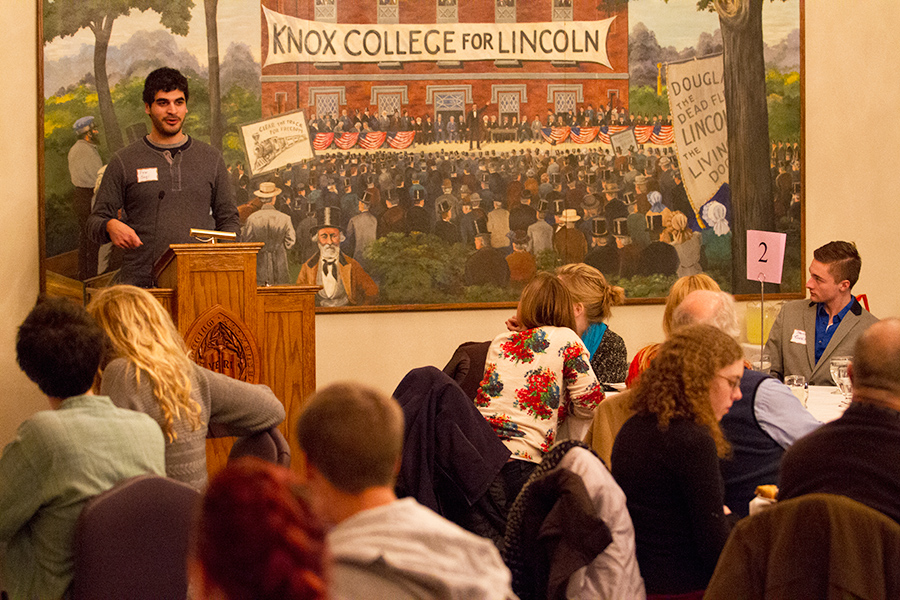

Venture Boldly

Office of Communications
2 East South Street
Galesburg, IL 61401


by Laura Pochodylo '14
The emphasis was on sharing stories and experiences as Knox College students who have studied abroad gathered at the traditional "Welcome Back" dinner on January 15.
Robin Ragan, director of the Eleanor Stellyes Center for Global Studies, urged students to keep talking about their time abroad and incorporate what they learned as they resume life at Knox.
Ragan, associate professor of modern languages, had been in Barcelona, Spain, running the Knox in Barcelona program for the past two years, and she was able to touch on a common experience with students: re-entry.
"I'm trying to re-adapt just like you," Ragan said.
Knox College President Teresa Amott also spoke at the dinner, recalling her experience of living and traveling between cultures as the daughter of an American Foreign Service Officer, moving every two to three years.
"I didn't study abroad, but lived abroad from the time I was born," Amott said. "I experienced what you are experiencing, and how the entry and re-entry is an important part of learning."
Sharing Transformative Experiences
Acknowledging that students come back from experiences abroad as "very different people," Amott also praised the importance of storytelling and how it can benefit students inside and outside of the classroom -- not just those who traveled abroad.
"What you bring back to the campus is every bit as transformative here as the transformation you underwent," she said.
"Storytelling is a part of what you will need to do to make sense of your experiences," Amott said. "If you find ways to share your experiences in the classroom, you have helped teach us all and become a part of the learning community. When you come back and share your experience, it makes us all better and it makes us all global citizens."
Storytelling started at each table as students, some dressed in traditional clothing from the countries they visited, shared an internationally inspired meal of rice dishes and baklava.
Food for Thought
Kelsey Cullum, a junior from Libertyville, Illinois, studied in Denmark for the 2012 fall term. She demonstrated a Danish custom as she ate: It is polite to keep a fork in one hand and knife in the other, and to refrain from setting down either utensil during the entire meal.
"It is considered childish to switch between fork and a knife," explained Cullum, who is majoring in anthropology and sociology.
At the same table, Danika Hill found Cullum's explanation of dining etiquette interesting because while she was abroad in India, she never used silverware. Instead, she used her hands to eat.
"I now know how to eat rice and yogurt with my fingers," said Hill. "You really get to know the texture of the food, and how hot it is, before you put it in your mouth. I really enjoyed it."
Firas Suqi, a junior from Chicago, Illinois, who studied abroad through an Associated Colleges of the Midwest program in Botswana, expressed frustration with the broad questions students are asked upon their return to Knox, such as, "How was it?"
He recommended that talking about food is a great way to share experiences. "That's what I like to share: what I ate."
He told a story about how his roommate in Botswana had never eaten cheese before, but enjoyed a local delicacy made of goat intestine.
"That's when I felt the most culture shock and knew I was in a different place," said Suqi, an anthropology and sociology major. "Cheese is weird, but goat intestines are normal."
Adventures in Travel
Many students, like Laura Thompson, agreed that the ability to travel during weekends and time off was a benefit to their study abroad experience. A senior Spanish major who studied in both Barcelona and Buenos Aires, Argentina, Thompson extended her stay in South America to explore Brazil and Peru.
She spent a week on a beach island in Brazil, where she found it difficult to communicate because she did not know Portuguese.
"I ended up just not talking to anyone for seven days, and I really got used to having that time by myself. When I found out all of the people who worked at my hostel were from Argentina, I was so excited to be able to talk," said Thompson, who is from Batavia, Illinois.
"I started (studying) Spanish at Knox, but to finally be able to communicate, Spanish felt like my home language. It made me realize how much communicating in Spanish has become a part of my life."
Cullum also shared a story about a trip where the language barrier caused culture shock.
"I went to Russia for a week, and it was my favorite trip. It was both the coolest place and the scariest place I've ever been," Cullum said. "People speak zero English there."
Hill, a junior from Naperville, Illinois, enjoyed the experience of living in Pune, a city of five million people in India.
"I loved living in a city," said Hill, an environmental studies major. "It was great to be able to walk wherever I needed to go, or to call a rickshaw."
Natalia Binkowski, a junior from Franklin Park, Illinois, spent two terms last year in Barcelona. Since her study abroad experience, she has decided to become a Spanish major.
"I could not have had this great experience without Knox's help. I would have never had the opportunity to travel so much," Binkowski said. "And I am so glad that it has enhanced my education back here in ways I could never have imagined."
Published on January 18, 2013